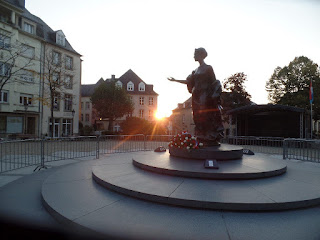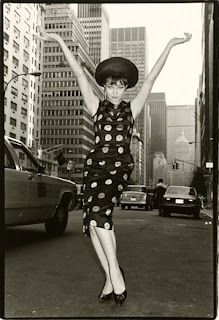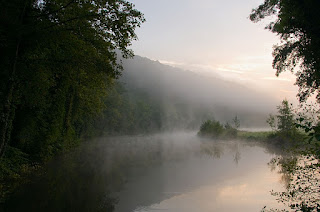For the centuries Luxembourg served as a barrier against the invading armies of Northern Europe. The city was surrounded by the thickly forested Ardennes and massive fortifications topped sheer cliffs, allowing hundreds of troops foil the attack of thousands.
Militarists called the citadel the Gibraltar of the North and in the autumn of 2011 I was appointed the pseudo-resident writer for an embassy overlooking the chasm of the Petrusse.
At the behest of Madame l’Ambassador.
We knew each other from London, Paris, and New York.
Even Thailand.
“Bring your evening dress. You will have many occasions to sport it.”
It was buried in the top floor of the Fort Observatory and still fit albeit a little snug.
AP was impressed and said, “I haven’t worn my tux in years. You want to borrow my tie.”
Friends warned Luxembourg was the most boring city in Europe, but the aeroport was only a 15 hour flight from my family in Thailand.
I was greeted inside the terminal by her French driver, who explained that Madame l’Ambassador was attending a meeting at the EEU headquarters.
Madame l’Ambassador had warned how her duties ate up much of her days and evenings. Writers were accustomed to the solitary life and I told Michel, as we walked to the Embassy’s Jaguar, “I’m a writer. I’m used to the solitary life. Let’s go.”
The drive to the residence lasted fifteen minutes in the Jaguar with the flag.
Upon arriving at the residence guided me to an attic room.
“There is no one else here. Only you and Madame l’Ambassador and her dog Dido.”
For the first weeks Madame l’Ambassador and I made the rounds of parties, cultural events, and diplomatic ceremonies. She was the most beautiful women in that city and good company. I told everyone that we were just friends and that was the truth.
Every day I wrote about a hitchhiking trip in 1974.
Boston-the Rockies-Reno-Santa Cruz-Moonlight Beach-Needles-Tulsa-the White Mountains.
1974 and Cross-Country America were far away in time and distance.
The locals were cold and I repeated my daily routine with an appalling sameness.
Wake up – write – eat – drink – sleep.
I tried to enjoy myself in purgatory.
On the weekends Madame l’Ambassador and I biked through the nearby forests.
We attended openings at the Mudam museum.
During the week I traveled out of the city. Chateaus dotted the country. The prosperous towns surrounding them were quiet day and night. No one said ‘Addi’ the Luxembourg word for hello.
Strangers were strangers in Luxembourg before I succumbed to loneliness.
To the west was Belgium. Once out of the Ardennes the countryside became flat as Kansas and Jacques Brel had famously sung of his native land, “La plat pay qui est miene.”
I knew one person in that country.
Vonelli.
We hadn’t seen each other in years.
He had been working in Eastern Europe ever since the Fall of Communism.
Before too.
I called the art dealer and he invited me to visit him in Charleroi.
“Charleroi?”
“You know of it?”
“Yes.”
My friend Fabo came from Charleroi.
I knew the oil engineer from Pattaya.
The Buffalo Bar was our home away from home and Fabo had always said, “I will kill myself before I go back to Charleroi.”
I was about to find out why, because I accepted Vonelli’s invitation.
He had always been a good host.
When I told Madame l’Ambassador of my impending trip, she said, “Charleroi has a reputation for being the ugliest city in Europe. Magritte’s mother committed suicide in Charleroi. I think she threw herself into a canal.”
“I’d expect nothing less from the ugliest town in Europe, but as Serge Gainsbourg famously said, “Ugliness has one great advantage over beauty, it is not diminished by the passage of time.”
“And Serge was not a handsome man.”
“But Jane Birkin loved him.”
“Yes, she did.”
The love of Beauty and the Beast.
Madame l’Ambassador’s daughter TGVed up from Paris and asked incredulously, “Why are going to that hellhole?”
“To see a friend.”
“Must be a good one.”
“You’re probably right about that.”
“What’s he do there?”
“I don’t know.”
People whispered that the Floridian expatriate was a spy. Vonelli and I both knew better than to ask questions to which there are too many answers, because Vonelli was never at liberty to say where or why or when or with whom.
We had met in Paris, the eternal city of light.
I loved that city and wondered why I left in 1986.
It could have been, because of a woman.
Candida.
She was a married woman now.
Her husband was a very successful publisher.
I was still a very well-unknown writer.
In some ways I was happy.
More often than not.
I missed my family.
Over the next days Madame l’Ambassador’s dog looked at me funny, as if she was confused as to why I would leave her, and I told Dido, “I’ll be back for the weekend.
She licked my hand.
Dogs will believe anything.
Madame l’Ambassador’s cat couldn’t care less about my staying or going.
The bed was her throne.
A refuge of warmth and comfort.
A day later I caught the morning train to Bruxelles.
The Belgium-bound train pulled out of the station on time.
It arrived at every stop on schedule and left at the minute of departure.
Arlon-Habay-Libramont-Namur.
I changed trains at Namur. Charleroi was only thirty minutes away to the south.
The local train passed through Floreffe, Solvay, and Chatelet
Dead trains rusted in a railyard on the outskirts of my destination.
The graveyard served as a warning. We were arriving at Charleroi.
Vonelli waited at the station.
A smile on his bearded face.
“Come on, I show you some of the sights.”
“The city government spent a lot of money on the terminal plaza,” he explained, then added, “It’s mostly used by junkies and glue-sniffers.”
They were everywhere and there wasn’t a a single policeman in sight.
Charleroi belonged to the underclasses.
Vonelli explained the politics, “The city tore up the main shopping street five years ago. They never finished it, because the mayors stole all the money. The last four mayors are in prison. The fifth fled the country.”
“They did an even better job on the tram. 150 million Euros and counting. No rails. Only graffiti.”
“Cool.” I sort of liked Charleroi.
It looked a little like the East Village in 1976, except there were no punks.
Only junkies and meth heads on permanent drug holiday.
But I understood Fabo’s disdain for his hometown.
“Nobody seems to live here,” I mentioned to Vonelli, staring at the massive coal mounds dotting the cityscape.
“Those terrils aren’t going anywhere. Sometimes people climb them and get killed in coal ash avalanches. So don’t even think about going to the top of one.”
“This town is a wreck,” I said with admiration.
“The city collapsed after the closure of the steel mills and coal mines. The only jobs now are graft or welfare or thievery and stealing guns or dealing drugs.”
“Like Detroit.”
“Only smaller.”
At least the graffiti was poetic.
“Come on, we’ll go to my place and have a proper Belgium lunch.” Vonelli led me across the Sambre Canal and we caught a taxi to Montigny.
His house was a mansion on ten hectares bordering an autoroute. I could clearly hear the cars and Vonelli said, “Charles Trenet, the French singer, said that he like to think of the noise like the distant surf. A constant hush of traffic. Actually I’m getting used to it.”
“I probably could as well.” I was half-deaf in one ear, but I could hear his song LA MER in my head with both ears intact.
We walked back to the house and I put my bag inside the house.
It belonged to a doctor. The rent’s a 1000 Euros a month.”
“”That wouldn’t get you a studio in New York.”
“Or Paris. So here I am. Charleroi. Your room’s the first on the right at the top of the stairs.”
The inside temperature was cool, although not as chilly as my old house in the west of Ireland.
Nothing was colder than the old schoolhouse.
When I came downstairs, Vonelli suggested lunch at his local.
“Moules-frites?”
“Exactement.”
They were delicious.
And then I played pinball for dessert.
The total cost of our meals was 25 euros complete with salad, dessert, and a carafe of white white. I was beginning to like Montigny too.
A friend of Vonelli arrived from Budapest along with the sun. The Charleroi Aeroport was connected with scores of cities throughout Europe. Igor was a good cook and promised a goulash for dinner.
But first beer.
The best Belgium beers came from Trappist monasteries, which had been established in the 17th Century to feed the people and finance good works.
We drank beer on the lawn and listened to the autoroute.
It sounded nothing like the sea.
We ate an early dinner. Igor was flying home. His goulash was excellent.
When I woke in the morning, Igor was gone.
“Back to Budapest.”
I’ve always wanted to see that city.”
Along with Prague and Vonelli said, ” But for now we’ll bike around the city and see all the wonders of Charleroi.”
“What a lovely idea.” No one else was vacationing here.
We rode along the Sambre canal into the city. The bikes were old, but not as old as us.
Vonelli was a good guide and explained, “Charleroi has been peopled since before history, but in 1666 the Spanish built a great fortress, which was passed back and forth to the Dutch, Spanish, and Austrians, until the French seized the city during the Revolution. Napoleon slept here before his defeat at Waterloo.”
“I’ve been to that battlefield. Defeat and Victory are close friends.” 1666 must have been Satan’s year.
“People came here to work in the mines and mills. It’s all shut now.”
The idle steel mills.
The empty rail yards.
Nothing and no one seemed to work in Charleroi and I said to Vonelli, “I feel like Charleroi. In a state of ruins, but you can tell it was something once.”
“But not anymore.” He gazed south to the range of coal terrils. The coal heaps were the highest mountains in this part of Belgium. “Let’s head back to civilization.”
Vonelli had a hard time biking uphill to Montigny. We walked a good part of the way. Neither of us was in a rush.
Back at Chateau Vonelli and we dined on left-over goulash, drank Tokaj wine, and listened to jazz by a fireplace.
“Tomorrow we’ll have a good walk to the Abbaye d’Aulne. It’s abandoned.”
“I wouldn’t expect less from Charleroi.”
I called my wife in Thailand.
Angie needed money for school
She was # 1 in her class.
And my son Fenway was my spitting image.
Vonelli and I spoke about my family.
“You think you will ever go back?”
“In December.”
“What about for good?”
My old crowd had left Thailand for Europe and Australia.
“Times are tough over there for farangs or westerners. I’d love to leave the west, but I need money to support my kids. Maybe one day.”
Only Fabo was working.
A dangerous job at sea.
While I was marooned in the West.
A writer-in-residence without pay.
Seated in a comfy chair I stared into a fire and listened Duke Ellington on the stereo. Vonelli asked if I wanted to go upstairs.
“No, I’m good here.”
Vonelli covered me with a blanket.
And I drifted into dreams.
Paris.
Gabrielle.
The East Village.
Ann.
Sri Racha.
Mem.
My mind sleepwalked around the world, but I woke far from those destinations of my heart.
I was in Montigny.
Ten klicks down the road from the ugliest city in Europe.
I lay on the floor. I had no idea how I had moved in the night. I rose to my feet. It was almost noon. I never slept this late. Vonelli was in the kitchen, preparing tea and toasting a baguette.
“Good night sleep?”
“Not bad. I was a little haunted by my dreams. Reliving my life without a change. Not one bit. Almost like I was trapped by the past.”
“”You’re not trapped here. Today we’ll walk to the Abbeye d’Aulne.”
Vonelli explained how the Abbaye had been founded in 657 as a Benedictine monastery, “In 1147 it became a Cistercian Abbey, swinging between splendor and decadence until it was destroyed by French revolutionary troops.”
“Do they brew beer?”
“A good one.”
It was a little past noon and I said, “Then let’s go.”
We descended down Rue des Landelies to the Sambre Canal.
A train line cut across the water way.
“Do we wait?”
“It’s faster to walk,” said Vonelli.
“How far?’
“About three kilometers and then it’s a good meal at La Guinguette.”
Less than two miles. Maybe a thirty minute fast walk.
A melting mist rose from the canal.
“Why don’t you go live in Thailand? asked Vonelli.
I was tired of everyone asking me this question, but this afternoon I had a different answer than before.
“I wish I could, but Thailand is not all beaches and Buddhas. Making money out there isn’t easy either.”
I explained how police had shut my F1 business over licensing. Going back was possible, but life there was tough without money.
Everyplace was.
Without a job I was living off a dwindling inheritance from my father.
Pi Poo or Grandfather Frank had come out to see his god-daughter, Angie in 2005.
One of the two family members who came out to visit.
The other was my cousin, the Bishop.
Back in 1999.
Both of them were gone.
No barges plied the tranquil Sambre and geese accompanied us along the towpath.
The water arced south.
The gaggle waddled into a marshy lake.
500 meters farther along we came to a two-story stone house by a lock.
The ex-spy led me inside La Guinguette.
The dining room was tidy. We ordered beers from the abbaye and moules-frites for the second time in three days.
The beer was strong. The first went down fast. Vonelli waved for another two.
We ate with our hands.
The moules were fresh out of the Atlantic.
We spoke about his old girlfriend.
I had lived with Yorke on Ile St. Louis. Just as a friend. We sometimes called her Cruella, but she was mostly nice to me.
We ordered another round of beers.
“You know I really liked her.” Vonelli rarely spoke of love.
Yorke was a good laugh and I told Vonelli, “If I go to Paris, I’ll say hello for you.”
“You think she’d ever come up here?” He signaled for ‘l’addition’.
“To Charleroi?”
“To see the ugliness.”
Even ugliness had its beauty.
Serge Gainsbourg knew the power of ugliness too and I said to Vonelli, “Who can read the mind of a woman?”
We raised our glasses and finished our beers.
.
The lock was filled with green water. The gates seeped the river. In the distance lay the ruins of Aulne.
“They really are ruins.”
“There hasn’t been an Abbe here since the French Revolution. Over two hundred years.”
“The Black Monks mustn’t have been popular with the mob.” Any traces of the Benedictines had been washed away with the deluge of the Terror.
“No, everyone loses touch with people. Few of us have to explain why. Neither do these stones.”
The chapel hadn’t seen a roof in two centuries.
Its desecration made me feel young.
But not as young as the bride and groom celebrating their marriage at the abbaye’s auberge.
Two younger people starting a life together.
We walked away.
Just Vonelli and me.
“There’s a bar close by.”
Les Caves de l’Abbaye d’Aulne had a terrace.
Vonelli and I eyed the ruins.
Like us they had been something once.
We ordered more beer.
“I think I have a few more years in me.”
“Me too.”
Neither of us hazarded a guess about how many.
“This isn’t so bad.”
“What about Charleroi?
“It has a good hold on ugly,” I said in truth.
“And a place of beauty.” That was also the truth.
Depending on the light beauty can be ugly, then again the light is always good after a few beers.
Even for Fabo, because we both drank beer.
fotos by peter nolan smith, angelina hue, jocko weyland, tom blackwell

















































